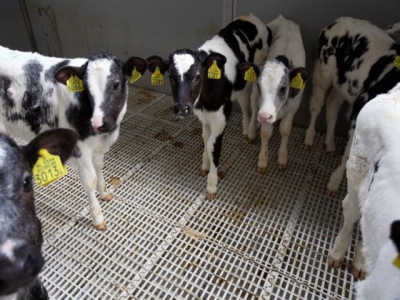Remote weighing and data recording in calves

Beef and dairy farmers will soon be able to weigh their youngstock and take their temperature several times a day, without having to lift a finger.
Photo: Jan Willem Schouten
A new project, which should be available on farms within the next 3 years, brings together the latest technology to remotely weigh and record data on calves and youngstock through to mature cattle. The project secured funding through Innovate UK, and at £1.13m (€ 1.27m) over 3 years is one of the biggest grants awarded through the scheme.
All data in 1 place
PrognostiX, which is developing the technology, is working with the Nottingham University and British Telecom (BT) on this smart solution, named Y-Ware. BT is working on the software and Nottingham University on the algorithms to turn statistics into meaningful alerts to farmers. Y-Ware is a small bolus that needs to be inserted into the calf’s rumen. Combining it with long-distance LoRa wireless technology, all the data can be pulled together in one place.
Wireless weighing platform
Next to the bolus, the company is developing a wireless weighing platform. “The idea is to locate the weighing platform by a water trough – whether inside or outside, it doesn’t matter,” explains Alan Beynon, director of PrognostiX. “Each animal will then be weighed every time it drinks, and the information, along with its temperature, will be processed by the Edge hub before it is sent wirelessly to the farmer’s computer or mobile device.”
By developing unique Edge technology to process data at the point of collection, the system only sends alerts when needed – for example when an animal has a temperature or isn’t gaining weight, which saves on battery usage and minimises the data package required. It’s also possible to keep other farm records, such as medicine usage, on the bolus, keeping everything in one place.
Pneumonia and scours
The Y-Ware bolus can be used in calves from 14 weeks of age. In due course we will be able to gather data from other sensors – such as housing temperatures and humidity – and use that to create the optimum farm environment for animal health and welfare. Pneumonia and scours are the most common health problems in calves, typically costing £82 (€ 92) and £57 (€ 64) per affected calf, respectively. “Using this new technology to reduce the incidence of disease will yield considerable savings in medicine use alone,” he adds. “When you consider the amount of time farmers spend rounding up animals to weigh them or treat them for disease, the labour saving will also be considerable, with less stress and improved health and safety for all involved.”
Related news
 Flaxseed oil use may boost milk yield for cold-stressed dairy cows
Flaxseed oil use may boost milk yield for cold-stressed dairy cows Flaxseed oil use in organic dairy cows diets improved performance, feed efficiency and milk yield in cold conditions and highly digestible dietary starch
 Fibrolytic enzymes could boost dairy cow efficiency
Fibrolytic enzymes could boost dairy cow efficiency Dairy cows fed barley silage may see a boost to milk production efficiency when fibrolytic enzymes are added to feeds, say researchers.
 Sick or not? The green light will tell
Sick or not? The green light will tell A US company has developed a bright green LED light, which is attached to the animal’s ear and is able to warn the farmer if an animal is sick